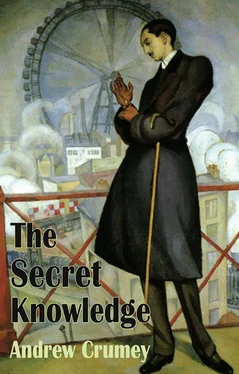Silent images of scientific authority: that big machine where they smash atoms. The space telescope. An urge to play but no instrument, his final greatest loss, and like all the others self-inflicted. He drove away his lover and his public, his recording label and his students, denied himself everything that was most precious, like he planned to screw up right from the start, planned his own destruction. Like Klauer. The dark demonic rhythm in his skull is the first movement of The Secret Knowledge , he hears its strident chords, feels left-hand leaps he’ll never show to anyone. The performer needs an audience, take that away and it’s God or nothing. Music is truth, the world prefers illusion.
The programme note still writes itself inside his head, critical commentary on an event that will never happen. There is no “secret knowledge”, that surely is the implicit message of a work determined, like the man who made it, to shock. Striking is its quality of montage, the disconnectedness of components sequentially juxtaposed without evident logic. Like getting back from a concert tour and finding your partner has been unexisted. That sudden theme in G sharp minor: where else is it to be found, in the remaining composition or entire universe? Its singularity is guarantor of significance and critical death sentence. When complicity is the only possible success, failure becomes imperative. What Conroy’s telling himself is that the sole available outcome of all this is disaster.
He needs to look up some references but hasn’t brought his books; he tries to recall what Adorno said about the commodification of music. Mass culture replaces critical appreciation with mere recognition: to hear anything often enough is equivalent to liking it. We become nicotine addicts conditioned to think that what we crave is what we genuinely need and desire, the vocabulary of taste reduced to saying that a tune has a good beat. What the artist and philosopher have in common is their apprehension of a future existing unacknowledged within the present. Klauer could foresee the urban masses for whom the iPod would offer essential diversion.
He stretches for the remote and raises the sound, bringing the physicist’s chummy northern vowels into audible focus. Hundreds of millions of light years, and us a single tiny speck. Computer graphics colourfully erupt, dazzling as a stained-glass window. It dawns on Conroy he’s like the average person in one of his own concerts, nagged by desire for self-improvement but motivated more by hunger for distraction. When the TV physicist was a kid he must have been doing equations and reading textbooks same as Conroy was practising scales, not for fun but out of a rare unnameable compulsion that amounted to belief in the future.
Instead of a single universe there’s a multiverse.
And then the phone rings. Takes a moment to recognise the sound that’s startled him, insipid peeping from the corner with a dodgy stain where something maybe had a crap once, goes and lifts the receiver, plastic’s an unnameable colour between beige and yellow, sticky in his stooping grip. Holds the dirty thing to his ear and waits, says nothing, expects a voice but there’s only the sound of empty wires and lonely nights, some jerk like him hoping it’s a woman at the other end, though against his own TV’s low mumble Conroy can’t even hear breathing, a void without background.
An infinite number of possible worlds and alternative realities.
The caller’s holding, this is almost entertaining, Conroy walks back across the room, dragging the phone unit that dangles from the end of the handset cable like a wounded animal, lifts the remote from the chair arm and kills the volume, lets his attention fall fully on the absence at his ear, the black hole of non-being. A tease he won’t give in to, the crackle of static is a symphony, a constellation of diamonds on a velvet cushion of silence, he rests his head against the softness of endless stars. The line goes dead.
They’ve got his number. He needs to move on, find another safe house, though he’s so tired he wonders if it might be better to surrender. Slumped in the armchair once more he gazes at the television, prefers it without sound. Closes his eyes and when he opens them can’t tell if he’s seeing the programme or an advertisement, whatever it is he won’t buy it. Closes again then suddenly it’s morning, the sky white as bird-shit, mouth like sandpaper, limbs stiff and his head aching.
Later he’s in the park, sitting on a bench spilling milk from a carton on his chin and overcoat while cold sunshine burns his eyes. He’s thinking about Paige, whether to send the score like she asked.
“Hello, David.”
Startled, Conroy turns to see beside him a haircut and zippered jacket he recognises. It’s the police inspector.
“What do you want? Put another bug on me?”
“Those students, the ones your neighbour saw.”
“I’ve done nothing wrong.”
“Give me their names.”
He has to protect Paige. “I never saw them.”
“They were at your house. And you’ve been making abusive phone calls.”
“I don’t live there any more.”
“Wishing our soldiers dead. Inciting violence. We have to think of public safety, national security.”
“I’ll give you any help you want as long as you tell me where Laura is.”
“This was never about her.”
Conroy drains the last of the milk and wipes his lip. “I’ve been trying to remember the assignment she was on.”
“Let’s stick to the point.”
“Some big corporation.”
“How many others were involved?”
“New technology. Does something to your brain.”
“They posted those messages from your computer. You do realise you could go to prison for this, David? Unless you decide to co-operate.”
The reality is startling; Conroy looks at the inspector’s profile beside him and sees a man confident of his own power, a man like a particle accelerator. “What messages?”
“Don’t pretend you don’t know. I’ll give you time to think about it, but not long.”
“Why not arrest me now?”
“Give us what we want and I’ll make sure you get the help you need.” The inspector stands. “Do the right thing.” He walks away.
Conroy places the empty milk carton on the bench beside him, reaches into his pocket and searches until his fingertips find what he expects, the device that he pulls out, gleaming in the sunshine. He hurls it away across the grass and it makes his head feel clearer, there’d been a buzzing before but no longer, he can hear birdsong. In the distance, near some trees, a man stands watching him.
He doesn’t know anything about those messages but needs to find out, he leaves the park swiftly, trying to lose the guy who’s tailing him, though as he nears the library he sees him again, a figure on the opposite street corner facing the other way in a poor attempt at concealment. Inside the library Conroy finds a row of unused computers, he’s never been before and expects to be able to log on freely but when he sits down at one of the screens he finds it prompting him to enter a number. Types a few random sequences but nothing works, then a woman with a false name badge interferes, says he can have temporary access if he shows proof of identity. He leaves immediately.
Outside there are closed-circuit cameras disguised as lighting fixtures. If our every movement is monitored and recorded then how can there possibly be time for anyone to watch it all? The accumulated information is greater than life itself, a paradox that follows him to the high street and an electronics store where he jabs at the keyboard of a display laptop and is again required to enter a password which a looming gangly assistant quickly supplies, leaning past Conroy to type, his nylon shirt exuding cheap deodorant. The assistant wants to know what sort of machine Conroy is looking for, whether it’s for gaming or general surfing, for individual or family use, wants to know everything except who Conroy is, so Conroy says he’d like to try the internet for a few minutes and is left alone to play.
Читать дальше











